Unbroken: Path to Redemption
 for thematic content and related disturbing images.
for thematic content and related disturbing images.
Reviewed by: Shawna Ellis
CONTRIBUTOR
| Moral Rating: | Good—highly recommended |
| Moviemaking Quality: |
|
| Primary Audience: | Adults Young-Adults Teens |
| Genre: | Christian Biography Drama |
| Length: | 1 hr. 38 min. |
| Year of Release: | 2018 |
| USA Release: |
September 14, 2018 (wide—1,525 theaters) DVD: December 11, 2018 |
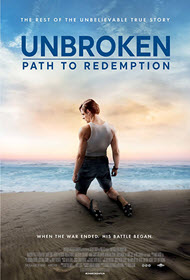

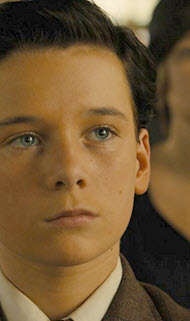
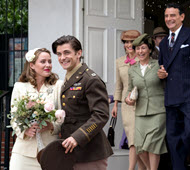

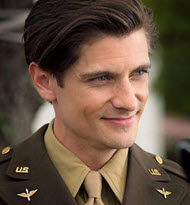
Struggling with Post-Traumatic Stress Disorder (PTSD)
Did God make the world the way it is now? What kind of world would you create? Answer
Why does God allow innocent people to suffer? Answer
What about the issue of suffering? Doesn’t this prove that there is no God and that we are on our own? Answer
Does God feel our pain? Answer
ORIGIN OF BAD—How did bad things in our world come about? Answer

Persevering through marital conflict
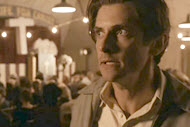
Are you good enough to get to Heaven? Answer
How good is good enough? Answer
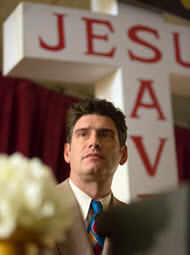
Will all mankind eventually be saved? Answer
| Featuring |
|---|
|
Samuel Hunt … Louis Zamperini Merritt Patterson … Cynthia Applewhite Will Graham—grandson of Evangelist Billy Graham … as Billy Graham Gary Cole … Dr. Bailey Bob Gunton … Major David DeLuise … Howard Lambert Bobby Campo … Pete Zamperini Vanessa Bell Calloway … Lila Burkholder Andrew Caldwell … Harry Read Gianna Simone … Sylvia Zamperini Maddalena Ischiale … Louise Zamperini Vincenzo Amato … Anthony Zamperini See all » |
| Director |
| Harold Cronk — “God's Not Dead” (2014), “God's Not Dead 2” (2016), “Jerusalem Countdown” (2011) |
| Producer |
|
Universal 1440 Entertainment Matt Baer Films See all » |
| Distributor |
Prequel: “Unbroken” (2014)
We now have two movies which focus on the life and story of one man, Louis Zamperini. Zamperini was a former Olympic athlete who served in World War II, survived 47 days in a drifting life raft in the Pacific, and then endured horrific atrocities as a prisoner of war in the hands of ruthless captors. Two movies, two glimpses into different aspects of this man’s amazing true story. Both films are based on the excellent biography by Laura Hillenbrand, Unbroken: A World War II Story of Survival, Resilience, and Redemption. The first film, “Unbroken” (2014) focused only on the first two descriptors in that subtitle. It was from a secular point of view with a slight nod and a footnote toward the role which God played in this man’s life. It was a story of human endurance and courage in the face of evil and suffering, and ends when Louis is rescued and returned to his family.
The more recent film, “Unbroken: Path to Redemption,” picks up where the first left off and differs greatly in that it unapologetically and powerfully highlights God’s hand in Louis Zamperini’s life. Its focus is not on how Louis survived his ordeal, but on how he struggled to find healing and extend forgiveness in his life afterward.
Even the promotional posters for these films differ greatly. The first film shows Zamperini holding a wooden beam defiantly over his head in the POW camp, an act of bravery and sheer force of will. The latter film shows Zamperini living in physical freedom, but on his knees in submission. These two completely opposite images sum up the heart and intent of each of these movies.
Some people are asking, “Why is a sequel needed?” What many viewers of the original film may not understand is that despite the first movie’s title, Louis was not “unbroken” at the end of the war. Although his body had survived, Louis was a truly broken man when he returned to his family. He had made it through the war, but he was not whole.
That is why I’m so glad to see “Unbroken: Path to Redemption.” I hope that every viewer who saw the prequel will watch this as well to see that the story did not end with Zamperini’s return to his home. The brutality, indignity and suffering he faced in Japan had consequences on his spirit, just as such traumatic experiences almost always have lasting consequences.
“Unbroken: Path to Redemption” opens with a stylized and very condensed recap of Zamperini’s life up to the point that he is reunited with his family. It is not necessary that someone see the first film to understand this one, although doing so would, of course, lend more depth. The horrific things Zamperini endured during WWII are referenced both verbally and in flashback form so that a new viewer can understand why he is so troubled.
Almost immediately, we see that Louis (played hauntingly by Samuel Hunt) has not been left unscathed by the things he has suffered. He is plagued by flashbacks, vivid nightmares and the taunts of the most cruel of his former captors, Mutsuhiro Watanabe (known as “The Bird”). As the film progresses, we see Louis try to find peace through various means—his marriage and family, an Olympic dream, and a quest for revenge. Most of all, Louis turns to alcohol in an effort to escape his nightmares. Although it is difficult to watch as Zamperini’s life unravels, I think we must see how broken he really is before we can appreciate the power of his redemption.
Louis is tormented by his wartime memories and nurtures a growing hatred toward his former captors, especially the sickly-sadistic Watanabe. David Sakurai gives a chilling performance as The Bird, who appears to Louis in dreams and flashbacks. He begins to take on an almost demonic presence, taunting and accusing, and is there to mock and jeer at pivotal moments of decision. I noticed that the words spoken by The Bird are sometimes laced with truth, but are spoken to create doubt and despair. In one scene, The Bird says about Zamperini’s wife, “She cannot save you!” This is actually a true statement, but is spoken with the intent to deceive and dishearten. This reminds me of Satan, who sometimes mixes just enough truth with his accusations to make us believe them. Louis begins to feel that the only way to silence The Bird is to travel to Japan, find Watanabe and kill him. He clings to the hope that doing so will finally bring lasting peace to his life.
Louis is also increasingly bitter toward the God who allowed these terrible things to happen to him. Early in the movie, when a priest points out that Louis should acknowledge God’s hand in all that he has come through, Louis laughingly replies, “Don’t worry. I blame God for everything!” As Louis continues to struggle, despite his vain human attempts at peace, he becomes more and more vocal about how he feels God has failed him or has even intentionally singled him out for pain. At one point, he cries out, “God is my enemy!” What Louis does not understand is that we are the ones who are enemies of God, if we have not been reconciled to Him through His Son Jesus (see Romans 5:10). Although Louis has hit bottom in so many areas of his life, he still clings to pride and resists the God who preserved him through so many trials.
Cynthia Zamperini (portrayed sweetly by Merritt Patterson) is deeply troubled by what she sees in her new husband. She does her best to comfort and help him, but soon learns that her love alone can’t heal her husband’s terrible spiritual and emotional wounds. Although she attends church and wears a cross necklace, it is unclear if Cynthia is a genuine follower of Christ throughout most of the movie. She does often turn to prayer for her husband. But, at other times, in desperation, she uses shame and the threat of divorce in an attempt to change him.
Louis has a warm and caring family, which is especially apparent in his older brother Pete (Bobby Campo). Pete is a calm and supportive influence in his brother’s life, and is bold enough to take action when things are spiraling out of control.
It is made abundantly clear that the world’s answers to life’s difficulties are not adequate. Alcohol, fame, and the quest for revenge don’t bring peace to anyone. Even good things such as the love of family or one’s spouse can’t suffice when a person needs healing from the inside out.
I appreciate that not only did the filmmakers choose to use Billy Graham’s grandson Will Graham to portray the famous evangelist, but that they also used the very text of his sermons in the movie. These words are used powerfully and effectively in the film, just as they were during the 1949 Los Angeles crusades when they were first spoken by Graham. Christ is unapologetically lifted up as the only one who can bring lasting peace. I hope that these timeless gospel truths, coupled with the powerful story of Zamperini’s changed life, will work today to bring others to Christ.
Technically, the movie has decent production values and scoring. Actors portray their characters convincingly. I have heard criticism from secular reviewers that this film has the appearance of a “straight to video” release, but I feel that is far too harsh and may be voiced simply because this is a film distributed by a Christian film company (PureFlix) and which exists to glorify God.
Although this film was produced by Christian filmmakers, some scenes may not be suitable for all viewers, because it dwells so long and heavily on Zamperini’s downward spiral and frightening flashbacks.
Content of possible concern
There is heavy drinking resulting in drunkenness and a scene of vomiting.
Flashback scenes are sometimes very intense, though not gory. In these, Louis is seen in dehumanizing conditions or perilous situations, such as being beaten, shot at by a plane, trapped underwater or near hungry sharks.
A couple argues frequently, and sometimes their confrontations are physical.
Cynthia and other women at the beach wear cleavage-baring 1940s style two piece swimwear, and Cynthia is seen in a low cut dress. Men wear partly open shirts at the beach.
A couple shares several kisses and passionate embraces.
One character tells another to “go to h*ll!” There is also a single use of the word d*mn.
A bowl of rice is seen crawling with insect larva.
If people choose to harshly judge this movie because its message of peace through accepting Christ seems too simplistic, they need to remember that this film was made to depict one man’s TRUE STORY of how God redeemed and healed him of terrible trauma. Not everyone will be instantly delivered from alcoholism, hatred, or PTSD the very moment they accept Christ, as Louis was. But the truth remains that Zamperini WAS instantly delivered of those things, and was even able to extend forgiveness to his former captors when their sins against him might seem unforgivable to us. By God’s grace, he was even able to forgive The Bird, writing in a letter to him, “Love has replaced the hate I had for you.” Who are we to deny the work God has done in another person?
Some might say that this film is an unnecessary postscript to Zamperini’s life. But I believe that “Unbroken: Path to Redemption” shows the MOST important part of his life. It looks at his story from an eternal point of view, because it shows us how Louis becomes alive in Christ. In the film, Louis himself says, “God kept me alive for this!”
Perhaps you have gone through things which have made you doubt or even hate God. You may think, just as Louis did, that God is your enemy. Actually, you are His enemy. But He made you. He loves you. He sent His Son to die for you. And He has brought you through whatever things you have been through to live another day, to have another chance to turn toward His Son Jesus as the only way to be saved.
Billy Graham urged the listeners in that tent in 1949 not to harden their hearts against what Jesus has done for them. I pray that hearts will be softened by this film’s message, and that people will see their own need for a Savior. And I pray that for those who already know Christ, this film will spur us on to forgive as we’ve been forgiven, to pray for our enemies, and to live life with hope and joy, just as Louis Zamperini did.
- Violence: Moderate
- Profane language: Mild
- Vulgar/Crude language: None
- Nudity: Mild
- Sex: Minor
- Occult: None
See list of Relevant Issues—questions-and-answers.


I didn’t know much about the movie ahead of time, so I was wondering who they would have to portray Billy Graham that could possibly do him justice. I was surprised the actor looked a little like him and sounded a lot like him. Of course, it turns out it was his grandson, who is a real life evangelist. Excellent casting there!
My only reservation is in the climax, when Louis comes forward and finally accepts Christ. Through all his struggles, he is adamantly resistant to God right up to the moment in the revival tent when he isn’t. It wasn’t really clear to me what “broke” him. I suppose portraying the movement of the Holy Spirit is challenging, and I may have missed something. Still, the movie was excellent and I recommend it to anyone with an interest in a good drama with spiritual themes.
While the movie is hard hitting and necessarily suited only to adults and mature teens, I don’t see any reason for it not to get the highest moral rating. If a movie about a man’s Salvation at a Billy Graham crusade doesn’t deserve it, what would!?
Moral rating: Excellent! / Moviemaking quality: 4
Moral rating: Excellent! / Moviemaking quality: 5
PLEASE share your observations and insights to be posted here.
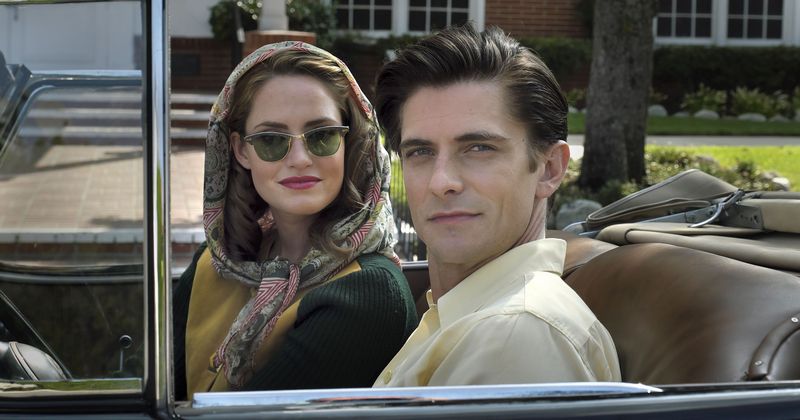






My Ratings: Moral rating: Excellent! / Moviemaking quality: 5